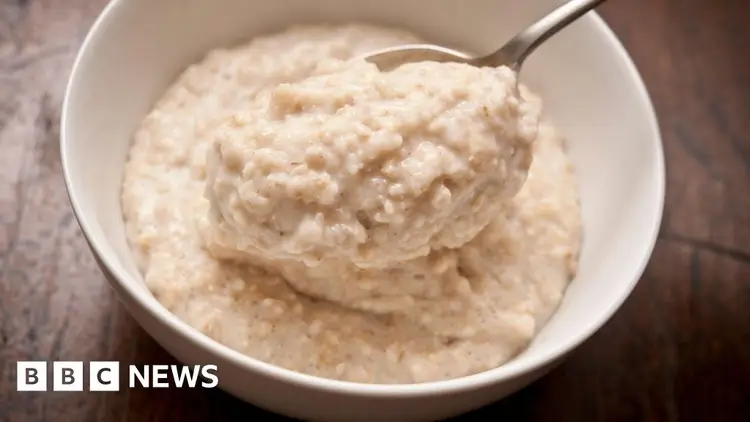Junk food: Porridge and crumpets fall under new ad ban

Some varieties of porridge, crumpets, and breakfast cereals are now part of a new restriction on advertising junk food.
The government states that the new law, which targets both paid online ads and TV commercials aired before 9 PM, aims to reduce obesity rates among children.
Starting in October 2025, the government will implement a ban on certain foods deemed "less healthy." This includes items such as fast food, sugary beverages, convenience meals, pastries, cereal bars, and sweetened yogurts.
Chef and television host Thomasina Miers praised the decision as "courageous," although it has faced backlash from some critics.
The specifics of the new regulations reveal that baked items like crumpets, scones, and pancakes are classified as unhealthy food under the updated law.
Commercials for sugary breakfast cereals will no longer be shown on television before the watershed. Foods like granola, muesli, and types of porridge—such as instant porridge and other hot oat cereals—are now categorized as "less healthy" options.
The advertising of sugary yoghurts and drinks, such as soft drinks and certain fruit juices, will be limited as well.
The government plans to categorize foods using a scoring system that evaluates their sugar, fat, and protein levels. They will prohibit advertisements for any items labeled as "less healthy."
This indicates that healthier alternatives, such as oatmeal varieties without added sugars, salt, or fats, as well as unsweetened yogurts, will not fall under the restrictions.
In addition to television commercials, the new law also covers paid online advertisements for these products to limit children's access to foods that are high in fat, sugar, or salt.
The new law is being introduced as childhood obesity rates continue to increase in the UK. According to NHS statistics, nearly 10% of children in their first year of primary school are classified as obese, with a figure standing at 9.2%.
According to NHS statistics, nearly one in five children (23.7%) experiences tooth decay by the time they reach five years old due to eating too much sugar.
In 2021, Boris Johnson, the former prime minister, introduced a nationwide restriction on television commercials for foods that are high in sugar, salt, and fat, aiming to address the issue. These ads will not be allowed to air before 9 PM.
The implementation of the ban was postponed to 2025 as the Conservative government stated that it wanted to allow the food and beverage sector some time to adjust to the new regulations, considering the ongoing cost of living challenges.
During her appearance on BBC Radio 4's Today program, chef and co-founder of the Wahaca restaurant chain, Ms. Miers, expressed her support for the advertising ban.
"The government is making strong and decisive moves against large food corporations that dominate our food landscape," she stated.
Ms. Miers mentioned that the ban would ease the financial burden on taxpayers. She referenced a study by Professor Tim Jackson from the Food Farming and Countryside Commission, which indicates that chronic diseases related to food contribute to an annual cost of £268 billion for the UK.
"We have one of the unhealthiest diets in Europe, and we understand that it leads to significant pain, discomfort, chronic illness, premature death, and preventable fatalities. It's putting a tremendous strain on the NHS," she explained.
Ms. Miers expressed that the "proposed law is insufficient" and encouraged the government to take more action in addressing unhealthy eating habits.
The government has stated that its new laws aim to significantly reduce childhood obesity, potentially stopping thousands of cases each year. It's anticipated that this initiative will cut 7.2 billion calories from the diets of children in the UK every year.
However, for Prasanna Callaghan, the owner of Crumpets café close to Buckingham Palace, the suggested ban on advertising baked goods seems completely absurd.
"It seems like everything's turned upside down," he stated to BBC News, suggesting that government laws should clearly differentiate between crumpets and classic junk foods, such as fried chicken.
"If you label crumpets as unhealthy snacks, it could seriously affect my business. Essentially, they're implying that crumpets shouldn't be part of your diet."
He described the griddled bread as a classic dish that people have been enjoying for a very long time.
In the meantime, Maria McCracken, a mother of two from Ashford, Kent, expressed her disagreement with the advertising ban. She emphasized the need to educate children about maintaining healthy and balanced diets.
Ms. McCracken shared with the BBC that she usually prepared meals from basic ingredients for her kids while they were growing up, although she noted that they also liked to indulge in takeout from time to time. "It's perfectly fine to do that," she remarked.
"It's related to how we raise our children," Ms. McCracken mentioned, implying that kids should be taught how to prepare healthy meals for themselves.
"It’s important for that to take place within the family instead of the government imposing restrictions before nine o'clock," she mentioned.
The Slimming World consultant expressed doubt about whether the ban on TV ads would truly address childhood obesity. "Do children really notice those ads? I don't believe they do."
The government's evaluation of the legislation highlights that "in general, the research shows a distinct connection between food ads and calorie intake."
Health Secretary Wes Streeting remarked that this policy represents an initial move towards transforming healthcare from a focus on treating illness to emphasizing prevention. He highlighted the government's goal of ensuring that every child has a healthy and joyful beginning in life.











































